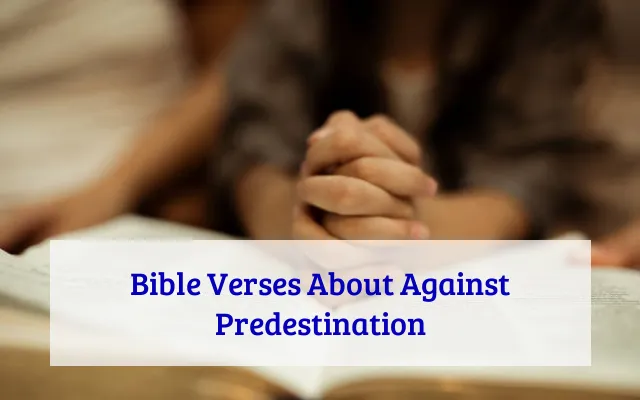Friends, if you’re searching for insights on “Bible Verses About Against Predestination,” this content is for you. Today, we’ll explore scriptures that challenge the concept of predestination and emphasize human free will. These verses will help you better understand the Bible’s perspective on individual choice and responsibility in matters of faith and salvation. Let’s delve into what the Word says about our ability to make decisions and shape our spiritual destinies.
Contents
- 1 What Does the Bible Say About Free Will vs Predestination?
- 1.1 Deuteronomy 30:19 – Choose life, blessings, and free will responsibility
- 1.2 Joshua 24:15 – Choose whom you will serve; embrace free will
- 1.3 Isaiah 1:18 – Sins forgiven; reason together with the Lord
- 1.4 John 7:17 – Understanding God’s will involves choosing to do it
- 1.5 1 Corinthians 10:13 – God provides escape from temptation
- 2 Biblical Evidence That Humans Have Choice in Salvation
- 2.1 John 3:16 – God’s love offers salvation to all who believe
- 2.2 Romans 10:9 – Confessing Jesus and believing grants salvation
- 2.3 Matthew 11:28 – Jesus invites all who are weary to come
- 2.4 Revelation 3:20 – Invitation to choose fellowship with Christ
- 2.5 2 Peter 3:9 – God desires all to repent, not predestined
- 2.6 1 Timothy 2:4 – God desires all to be saved
- 3 Scripture Verses Supporting Arminian Theology Over Calvinism
- 3.1 Hebrews 2:9 – Jesus tasted death for everyone, showing God’s grace
- 3.2 Titus 2:11 – God’s grace offers salvation to everyone
- 3.3 1 John 2:2 – Christ’s atonement for all, not just the elect
- 3.4 1 Timothy 4:10 – God is Savior of all, especially believers
- 3.5 Acts 7:51 – Resisting the Holy Spirit; hardened hearts reject God
- 4 Bible Passages About God’s Desire for All to Be Saved
- 5 Verses That Challenge the Doctrine of Election
- 5.1 Romans 11:32 – God’s mercy for all, beyond human disobedience
- 5.2 John 3:17 – God sent Jesus to save, not condemn the world
- 5.3 2 Corinthians 5:14-15 – Christ died for all, challenging predestination
- 5.4 1 John 4:14 – Jesus as Savior for the whole world
- 5.5 Colossians 1:23 – Continue in faith stable and steadfast
- 6 Biblical Arguments for Human Responsibility in Faith
- 6.1 Philippians 2:12 – Work out your salvation with fear and trembling
- 6.2 James 1:22 – Be doers of the word, not hearers only
- 6.3 Galatians 6:7 – You reap what you sow
- 6.4 Romans 12:1-2 – Transform by renewing mind, live discerning God’s will
- 6.5 Matthew 7:21 – True disciples do God’s will, not just profess faith
- 7 Scripture About God’s Universal Love and Invitation
- 8 Bible Verses That Emphasize Personal Decision in Following Christ
- 8.1 Luke 9:23 – Personal choice in daily self-denial to follow Christ
- 8.2 Mark 8:34 – Following Christ requires personal decision and self-denial
- 8.3 John 1:12 – Personal choice to become children of God
- 8.4 Matthew 16:24 – Choosing discipleship requires self-denial and bearing one’s cross
- 8.5 Romans 10:9-10 – Confess and believe for salvation
What Does the Bible Say About Free Will vs Predestination?
When exploring the themes of free will and predestination, it’s important to remember that the Bible contains rich insights that guide us. It’s like walking a path where each step reveals more about God’s relationship with us. Our choices matter, and there’s a divine plan at work, but how these two interact is a profound mystery.
Deuteronomy 30:19 – Choose life, blessings, and free will responsibility

I call heaven earth to record this day against you, that I have set before you life death, blessing cursing: therefore choose life, that both thou thy seed may live
Deuteronomy 30:19
Explanation:- This verse highlights the importance of human agency and choice in the biblical narrative. It underscores the concept of free will, encouraging individuals to choose life and blessings, suggesting that while divine guidance exists, personal responsibility in decision-making is paramount.
Joshua 24:15 – Choose whom you will serve; embrace free will

If it seem evil unto you to serve the Lord , choose you this day whom ye will serve; whether the gods which your fathers served that were on the other side of the flood, or the gods of the Amorites, in whose land ye dwell: but as for me my house, we will serve the Lord
Joshua 24:15
Explanation:- This verse highlights the significance of personal choice in serving God, underscoring the concept of free will. It encourages individuals to actively decide whom they will follow, suggesting that faith is a personal commitment rather than a predetermined path.
Isaiah 1:18 – Sins forgiven; reason together with the Lord

Come now, let us reason together, saith the Lord : though your sins be as scarlet, they shall be as white as snow; though they be red like crimson, they shall be as wool
Isaiah 1:18
Explanation:- This verse highlights the invitation from God to engage in dialogue, emphasizing free will. It suggests that, despite our sins, we have the freedom to choose repentance and forgiveness. This counters the notion of predestination, underscoring our ability to decide our spiritual path.
John 7:17 – Understanding God’s will involves choosing to do it
If any man will do his will, he shall know of the doctrine, whether it be of God, or whether I speak of myself
John 7:17
Explanation:- This verse highlights the importance of individual choice in discerning and following God’s will. It suggests that understanding divine guidance involves an active decision to embrace and act upon it, supporting the concept of free will in our spiritual journey.
1 Corinthians 10:13 – God provides escape from temptation

There hath no temptation taken you but such as is common to man: but God is faithful, who will not suffer you to be tempted above that ye are able; but will with the temptation also make a way to escape, that ye may be able to bear it
1 Corinthians 10:13
Explanation:- This verse highlights God’s faithfulness in providing a way out of temptation, underscoring human free will. It suggests that while challenges occur, individuals have the freedom and ability to choose not to succumb, emphasizing personal responsibility over predestination.
Biblical Evidence That Humans Have Choice in Salvation
The Bible often speaks to the incredible gift of choice that God has given us. It’s like being handed a key to a door of endless possibilities. This choice is not just a responsibility but a sacred invitation to walk closely with Him, embracing the path of salvation with open hearts.
John 3:16 – God’s love offers salvation to all who believe

For God so loved the world, that he gave his only begotten Son, that whosoever believeth in him should not perish, but have everlasting life
John 3:16
Explanation:- This verse highlights God’s universal offer of salvation through belief, underscoring the idea that humans have the choice to accept or reject this gift. It challenges predestination by emphasizing that anyone who believes can receive eternal life, affirming human agency in salvation.
Romans 10:9 – Confessing Jesus and believing grants salvation

That if thou shalt confess with thy mouth the Lord Jesus, shalt believe in thine heart that God hath raised him from the dead, thou shalt be saved
Romans 10:9
Explanation:- This verse emphasizes the importance of personal choice in salvation. It highlights that confessing Jesus as Lord and genuinely believing in His resurrection leads to salvation. This suggests that individual faith and decision are crucial, countering the idea of predestination.
Matthew 11:28 – Jesus invites all who are weary to come

Come unto me, all ye that labour are heavy laden, I will give you rest
Matthew 11:28
Explanation:- In this verse, Jesus extends an open invitation to everyone who is burdened, highlighting human choice in accepting His offer of rest. This counters the idea of predestination by emphasizing that individuals have the freedom to respond to Jesus’s call for salvation.
Revelation 3:20 – Invitation to choose fellowship with Christ

Behold, I stand at the door, knock: if any man hear my voice, open the door, I will come in to him, will sup with him, he with me
Revelation 3:20
Explanation:- This verse highlights the personal invitation from Christ to individuals, emphasizing human choice in accepting or rejecting fellowship with Him. It underscores the concept of free will in salvation, as believers are encouraged to actively respond to Christ’s call and open their hearts.
2 Peter 3:9 – God desires all to repent, not predestined

The Lord is not slack concerning his promise, as some men count slackness; but is longsuffering to us-ward, not willing that any should perish, but that all should come to repentance
2 Peter 3:9
Explanation:- This verse highlights God’s patience and desire for everyone to repent, emphasizing human choice in salvation rather than predestination. It suggests that God’s intention is inclusive, allowing individuals the freedom to choose repentance and salvation, aligning with the belief in free will.
1 Timothy 2:4 – God desires all to be saved

Who will have all men to be saved, to come unto the knowledge of the truth
1 Timothy 2:4
Explanation:- This verse highlights God’s desire for everyone to attain salvation, suggesting that human choice plays a role in accepting this gift. It challenges the notion of predestination by emphasizing God’s inclusive will, indicating that individuals have the freedom to choose faith.
Scripture Verses Supporting Arminian Theology Over Calvinism
Arminian theology emphasizes God’s love and grace that reach out to everyone. It’s like a parent calling out to their children, offering them guidance but allowing them to choose their steps. This perspective highlights the relational aspect of faith, where our responses to God’s call are vital.
Hebrews 2:9 – Jesus tasted death for everyone, showing God’s grace

But we see Jesus, who was made a little lower than the angels for the suffering of death, crowned with glory honour; that he by the grace of God should taste death for every man
Hebrews 2:9
Explanation:- This verse highlights that Jesus experienced death for the sake of all humanity, demonstrating God’s grace and love for everyone. It supports Arminian theology by emphasizing the universal scope of Jesus’ sacrifice, countering the Calvinist idea of limited atonement.
Titus 2:11 – God’s grace offers salvation to everyone
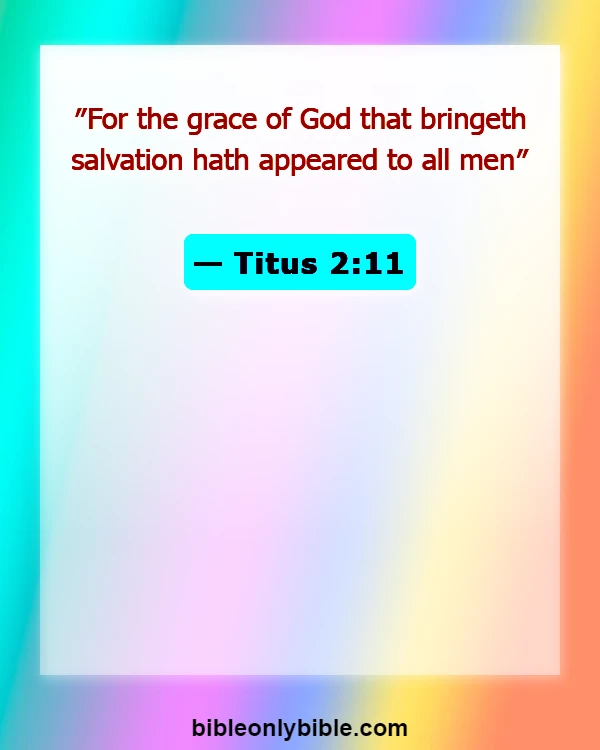
For the grace of God that bringeth salvation hath appeared to all men
Titus 2:11
Explanation:- This verse highlights the universal availability of God’s grace, suggesting that salvation is accessible to all people, not just a predetermined few. It supports the Arminian view that God’s grace extends to everyone, allowing each person the opportunity to accept or reject salvation.
1 John 2:2 – Christ’s atonement for all, not just the elect

He is the propitiation for our sins: not for ours only, but also for the sins of the whole world
1 John 2:2
Explanation:- This verse highlights the universal scope of Christ’s atonement, suggesting it extends to all humanity, not just a select group. This supports Arminian theology, which argues against predestination by emphasizing God’s offer of salvation to everyone, aligning with the belief in free will.
1 Timothy 4:10 – God is Savior of all, especially believers

For therefore we both labour suffer reproach, because we trust in the living God, who is the Saviour of all men, specially of those that believe
1 Timothy 4:10
Explanation:- This verse highlights God’s universal offer of salvation, affirming that He is the Savior of all people, yet with a special emphasis on those who believe. It supports the Arminian view that God’s grace is available to everyone, countering the idea of predestination in Calvinism.
Acts 7:51 – Resisting the Holy Spirit; hardened hearts reject God
Ye stiffnecked uncircumcised in heart ears, ye do always resist the Holy Ghost: as your fathers did, so do ye
Acts 7:51
Explanation:- This verse highlights the human capacity to resist God’s will, emphasizing free will in rejecting the Holy Spirit. It supports Arminian theology by illustrating that individuals can choose to harden their hearts, countering Calvinist views of predestination and irresistible grace.
Bible Passages About God’s Desire for All to Be Saved
God’s heart for humanity is vast and deep, desiring everyone to experience His love and salvation. Imagine a shepherd who longs for every sheep to return safely to the fold. This divine longing is beautifully woven throughout the Bible, inviting us to share in God’s compassion for all.
1 Timothy 2:3-4 – God’s desire for all to be saved
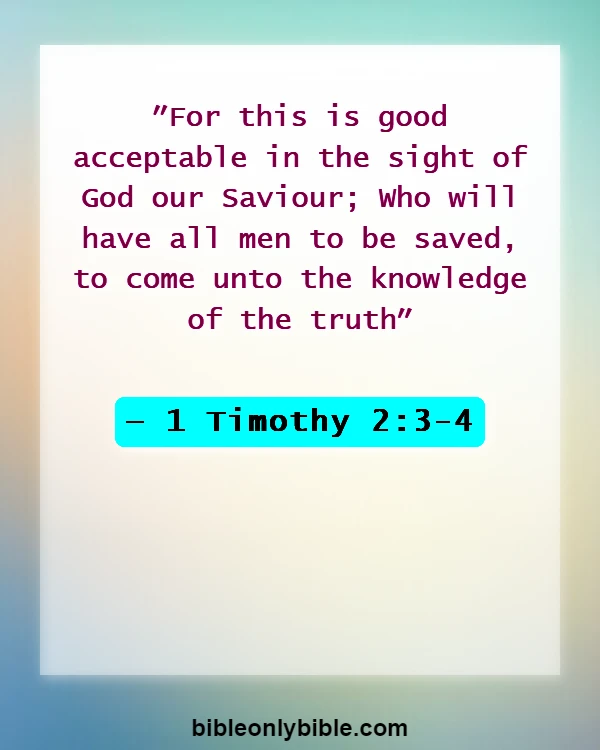
For this is good acceptable in the sight of God our SaviourWho will have all men to be saved, to come unto the knowledge of the truth
1 Timothy 2:3-4
Explanation:- This passage highlights God’s inclusive desire for salvation, emphasizing His longing for everyone to come to the knowledge of truth. It challenges the notion of predestination by underscoring that God’s will is for all individuals to be saved, reflecting His universal love and grace.
Ezekiel 18:23 – God desires repentance, not death, for the wicked

Have I any pleasure at all that the wicked should die? saith the Lord God : not that he should return from his ways, live?
Ezekiel 18:23
Explanation:- This verse highlights God’s desire for repentance rather than punishment. It underscores the idea that God does not take pleasure in the death of the wicked but instead wishes for them to turn from their ways and live, challenging the concept of predestination by emphasizing free will and redemption.
John 12:32 – Jesus draws all people to Himself

I, if I be lifted up from the earth, will draw all men unto me
John 12:32
Explanation:- In John 12:32, Jesus expresses His intention to draw everyone to Himself, highlighting God’s inclusive love and desire for universal salvation. This verse suggests that salvation is available to all, challenging the notion of predestination by emphasizing God’s outreach to every individual.
Luke 19:10 – Jesus seeks and saves the lost
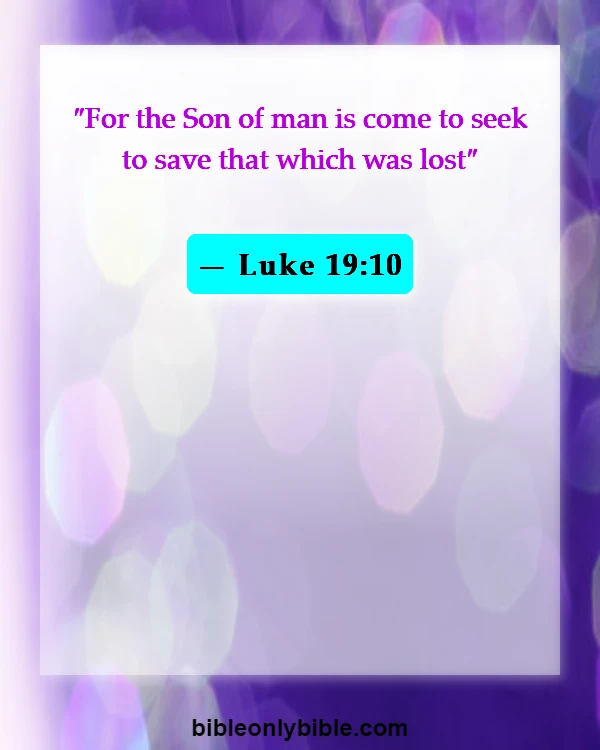
For the Son of man is come to seek to save that which was lost
Luke 19:10
Explanation:- This verse highlights Jesus’ mission to seek and save those who are lost, underscoring God’s desire for everyone’s salvation. It emphasizes God’s inclusive love and counters the idea of predestination by showing that salvation is available to all who are lost.
Isaiah 45:22 – God invites all to turn and be saved

Look unto me, be ye saved, all the ends of the earth: for I am God, there is none else
Isaiah 45:22
Explanation:- This verse highlights God’s open invitation to everyone for salvation, emphasizing His desire for all to turn to Him and be saved. It underscores the inclusive nature of God’s grace and His wish for all people, regardless of background, to seek Him and find redemption.
Verses That Challenge the Doctrine of Election
Some scriptures invite us to reflect on the doctrine of election, suggesting that God’s grace extends beyond predetermined boundaries. Think of it as an open invitation to a banquet, where every seat is available, challenging us to reconsider how God’s mercy is offered.
Romans 11:32 – God’s mercy for all, beyond human disobedience
For God hath concluded them all in unbelief, that he might have mercy upon all
Romans 11:32
Explanation:- This verse highlights God’s overarching plan to extend mercy to everyone, regardless of human disobedience. It challenges the idea of predestination by emphasizing that God’s compassion and grace are available to all, suggesting a universal scope of divine mercy beyond predetermined election.
John 3:17 – God sent Jesus to save, not condemn the world

For God sent not his Son into the world to condemn the world; but that the world through him might be saved
John 3:17
Explanation:- The verse highlights God’s intention of salvation for all humanity, emphasizing His inclusive love rather than selective judgment. It challenges the idea of predestination by underscoring that Jesus’ mission was to offer redemption universally, not to condemn or limit salvation to a predetermined group.
2 Corinthians 5:14-15 – Christ died for all, challenging predestination
For the love of Christ constraineth us; because we thus judge, that if one died for all, then were all deadAnd that he died for all, that they which live should not henceforth live unto themselves, but unto him which died for them, rose again
2 Corinthians 5:14-15
Explanation:- This passage highlights that Christ’s love compels us, as He died for everyone, suggesting a universal scope of salvation. This challenges the concept of predestination by implying that all have the opportunity for life through Christ, not just a select few.
1 John 4:14 – Jesus as Savior for the whole world
We have seen do testify that the Father sent the Son to be the Saviour of the world
1 John 4:14
Explanation:- 1 John 4:14 emphasizes Jesus as the Savior for all humanity, challenging the idea of predestination by highlighting the universal scope of salvation. This verse suggests that God’s love and Jesus’s saving work extend to everyone, not just a select group.
Colossians 1:23 – Continue in faith stable and steadfast

If ye continue in the faith grounded settled, be not moved away from the hope of the gospel, which ye have heard, which was preached to every creature which is under heaven; whereof I Paul am made a minister
Colossians 1:23
Explanation:- This verse encourages believers to remain steadfast and grounded in their faith, highlighting personal responsibility and perseverance. It challenges the idea of predestination by emphasizing the need for continued commitment and active faith, suggesting that salvation involves ongoing human participation.
Biblical Arguments for Human Responsibility in Faith
The Bible often encourages us to take responsibility for our faith journey. It’s like being entrusted with a precious gift that requires nurturing and growth. Our actions, decisions, and faithfulness play a crucial role in this divine relationship, urging us to actively participate in God’s plan.
Philippians 2:12 – Work out your salvation with fear and trembling

Wherefore, my beloved, as ye have always obeyed, not as in my presence only, but now much more in my absence, work out your own salvation with fear trembling
Philippians 2:12
Explanation:- This verse emphasizes human responsibility in the journey of faith. It suggests that believers are actively involved in their salvation process, urging them to approach it with seriousness and reverence, highlighting the cooperative aspect of faith alongside divine grace.
James 1:22 – Be doers of the word, not hearers only

But be ye doers of the word, not hearers only, deceiving your own selves
James 1:22
Explanation:- This verse emphasizes the importance of actively living out one’s faith through actions, not merely listening or agreeing with the teachings. It supports the idea of human responsibility by highlighting the necessity for believers to engage and participate in their spiritual journey.
Galatians 6:7 – You reap what you sow

Be not deceived; God is not mocked: for whatsoever a man soweth, that shall he also reap
Galatians 6:7
Explanation:- This verse highlights the principle of sowing and reaping, emphasizing personal accountability and the consequences of our actions. It underscores human responsibility in faith, suggesting that our choices and efforts in spiritual matters directly impact our spiritual outcomes.
Romans 12:1-2 – Transform by renewing mind, live discerning God’s will
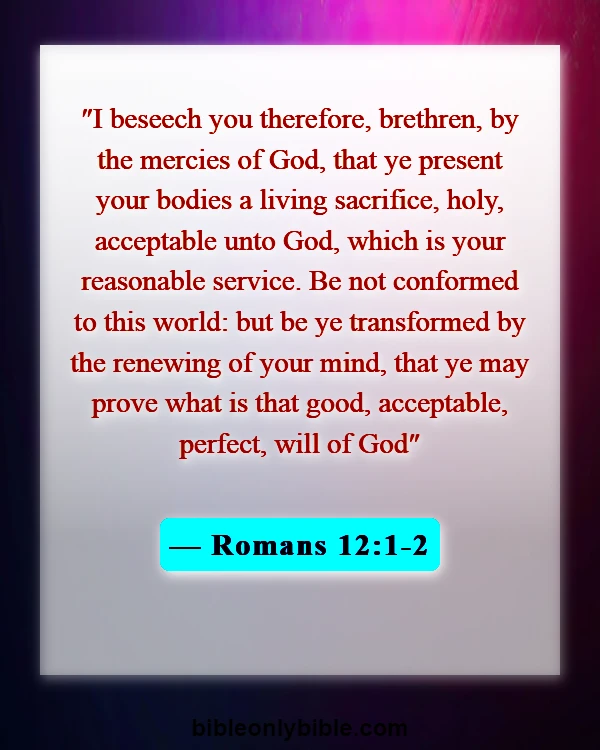
I beseech you therefore, brethren, by the mercies of God, that ye present your bodies a living sacrifice, holy, acceptable unto God, which is your reasonable serviceAnd be not conformed to this world: but be ye transformed by the renewing of your mind, that ye may prove what is that good, acceptable, perfect, will of God
Romans 12:1-2
Explanation:- Romans 12:1-2 encourages believers to offer themselves as living sacrifices and to be transformed by renewing their minds. This emphasizes human responsibility in discerning and following God’s will, highlighting the active role individuals play in their spiritual growth and faith journey.
Matthew 7:21 – True disciples do God’s will, not just profess faith

Not every one that saith unto me, Lord, Lord, shall enter into the kingdom of heaven; but he that doeth the will of my Father which is in heaven
Matthew 7:21
Explanation:- This verse highlights that true discipleship involves doing God’s will rather than mere verbal declarations of faith. It underscores the importance of active obedience and genuine commitment in one’s spiritual life, emphasizing human responsibility in aligning actions with God’s teachings.
Scripture About God’s Universal Love and Invitation
God’s love is like an endless ocean, inviting everyone to dive in and experience its depth. The Bible is filled with reminders of this universal call, beckoning all to come and receive the grace and love freely given, without reservation or limitation.
Isaiah 55:1 – God’s invitation for all to receive freely

Ho, every one that thirsteth, come ye to the waters, he that hath no money; come ye, buy, eat; yea, come, buy wine milk without money without price
Isaiah 55:1
Explanation:- This verse illustrates God’s open invitation to everyone, highlighting His universal love and generosity. It emphasizes that God’s grace and salvation are freely available to all, transcending human boundaries and predestination, inviting everyone to partake in His blessings without cost.
Romans 5:18 – Justification and life for all through Christ
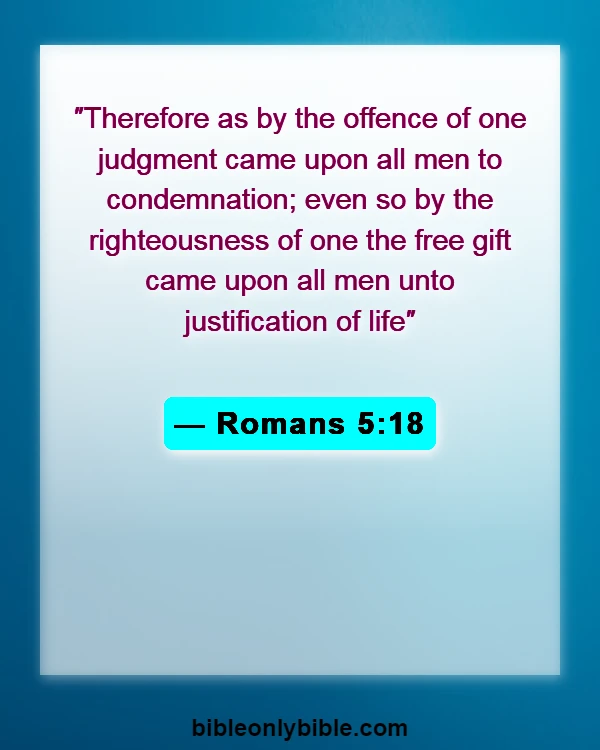
Therefore as by the offence of one judgment came upon all men to condemnation; even so by the righteousness of one the free gift came upon all men unto justification of life
Romans 5:18
Explanation:- Romans 5:18 highlights God’s universal love and invitation to all humanity through Christ’s redemptive act. It underscores the concept that justification and life are available to everyone, countering the notion of predestination by emphasizing the inclusive nature of God’s grace and salvation.
Matthew 22:14 – God’s invitation extends to all, few chosen
For many are called, but few are chosen
Matthew 22:14
Explanation:- This verse highlights that while God’s invitation to salvation is extended to everyone, not everyone responds or is ultimately chosen. It underscores the tension between divine sovereignty and human responsibility, emphasizing God’s universal love and the importance of individual acceptance.
Luke 2:10 – Good news of great joy for all people
The angel said unto them, Fear not: for, behold, I bring you good tidings of great joy, which shall be to all people
Luke 2:10
Explanation:- This verse highlights the angel’s message of joy and hope meant for everyone, underscoring God’s universal love and inclusive invitation. It serves as a powerful reminder that the good news is not limited to a select few, but is available to all people.
Bible Verses That Emphasize Personal Decision in Following Christ
Following Christ is a personal decision, much like choosing a path that leads to life and light. The Bible encourages us to make this choice with full hearts, embracing the journey with faith and trust. It’s a call to step forward and walk with Jesus each day.
Luke 9:23 – Personal choice in daily self-denial to follow Christ

He said to them all, If any man will come after me, let him deny himself, take up his cross daily, follow me
Luke 9:23
Explanation:- This verse highlights the importance of personal choice and commitment in the journey of faith. It underscores the daily decision to embrace self-denial and actively follow Christ, emphasizing individual responsibility rather than predestination in one’s spiritual journey.
Mark 8:34 – Following Christ requires personal decision and self-denial

When he had called the people unto him with his disciples also, he said unto them, Whosoever will come after me, let him deny himself, take up his cross, follow me
Mark 8:34
Explanation:- Mark 8:34 highlights the importance of personal choice and self-denial in following Christ. It suggests that discipleship is an active, voluntary decision, underscoring individual responsibility and countering the notion of predestination by emphasizing conscious commitment to live according to Christ’s teachings.
John 1:12 – Personal choice to become children of God
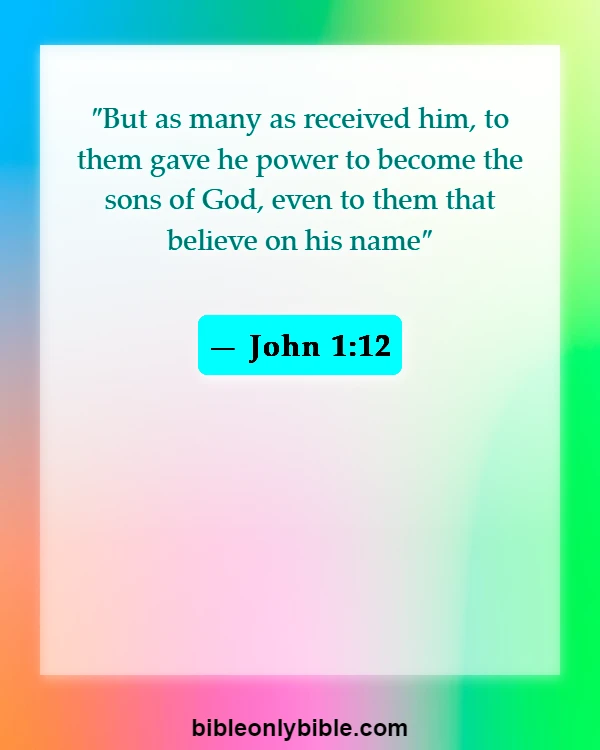
But as many as received him, to them gave he power to become the sons of God, even to them that believe on his name
John 1:12
Explanation:- This verse highlights the importance of individual choice in becoming God’s children. It underscores that accepting and believing in Jesus is a personal decision, emphasizing human responsibility and free will in the process of salvation, rather than predestination.
Matthew 16:24 – Choosing discipleship requires self-denial and bearing one’s cross

Then said Jesus unto his disciples, If any man will come after me, let him deny himself, take up his cross, follow me
Matthew 16:24
Explanation:- Choosing to follow Christ involves a personal decision to embrace self-denial and take up one’s cross. This verse highlights the active role individuals have in their spiritual journey, underscoring the importance of personal commitment and responsibility in discipleship, rather than predestined paths.
Romans 10:9-10 – Confess and believe for salvation

That if thou shalt confess with thy mouth the Lord Jesus, shalt believe in thine heart that God hath raised him from the dead, thou shalt be savedFor with the heart man believeth unto righteousness; with the mouth confession is made unto salvation
Romans 10:9-10
Explanation:- This passage highlights the importance of personal choice in salvation. It underscores that confessing and believing are individual acts, suggesting that salvation involves a conscious decision to embrace faith, rather than being predetermined, thus emphasizing human responsibility in following Christ.
